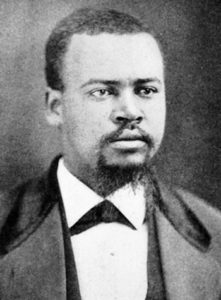
John Hyman
On this date in 1840, John A. Hyman was born. He was a Black storekeeper, farmer, and politician.
John Adams Hyman was born a slave near Warrenton in Warren County, North Carolina, and was taught to read and write by a jeweler named Mr. King in that town. When it became known that he had educated Hyman, King, and his family were forced to leave Warrenton. In 1861, Hyman was sold as a “brute” to the state of Alabama. While a slave, he was sold eight times because of his owners’ anger by getting an education. After the American Civil War, Hyman returned to Warren County, received an elementary education, and became a trustee of a school in the area.
He farmed and opened a country store in 1870 that closed in 1872. While in these two professions, he attended the state’s Black convention of 1866 and served as the voting registrar in 1867. Hyman also served on two committees of the Freedmen’s Convention of North Carolina in 1865 and was elected to the constitutional convention of 1868. In 1874, he captured a seat in the forty-fourth Congress representing North Carolina; he served on the Committee on Manufacturers. He introduced measures to compensate Black citizens for losses during the American Civil War. He sponsored legislation authorizing the Treasury Department to build a lighthouse at Gull Rock on Pamlico Sound in North Carolina.
After losing his bid for renomination, he returned to farming and ran a liquor store. Hyman also devoted much of his time to the Colored Masons of North Carolina. He was a steward and Sunday school superintendent of Warrenton Colored Methodist Church. He was expelled on embezzlement charges, left the state, and moved to Washington, D.C. He then went to work for the Department of Agriculture’s seed dispensary. John Hyman died on September 14, 1891.
Encyclopedia of African American Culture and History
Volume 1, ISBN #0-02-897345-3
Jack Salzman, David Lionel Smith, Cornel West